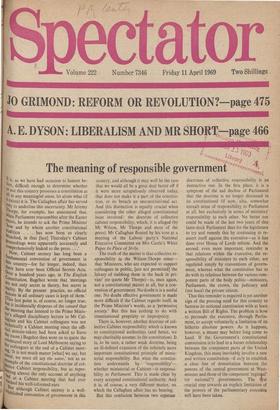The meaning of responsible government
is, as we have had occasion to lament be- fore, difficult enough to determine whether or not this country possesses a constitution at all in any meaningful sense, let alone what (if It exists) it is. The Callaghan affair has served 9111Y to underline this uncertainty. Mr Jeremy Thorpe, for example, has announced that, when Parliament reassembles after the Easter recess, he intends to ask the Prime Minister how and by whom another constitutional tradition . . . has now been so clearly °reached, in that [last] Thursday's Cabinet Proceedings were apparently accurately and eftprehensively leaked to the press. .. , Now, Cabinet secrecy has long been a fundamental convention of government in th18 country—for far longer, indeed, than there have ever been Official Secrets Acts. °ver a hundred years ago, in The English Constitution, Bagehot wrote that 'meetings are not only secret in theory, but secret in reality. By the present practice, no official ruinute in all ordinary cases is kept of them.' (This last point is, of course, no longer true: the it incidentally disposes of the canard that ti meeting that listened to the Prime Minis- Ws alleged disciplinary lecture to Mr Cal- ,faghan and his Cabinet colleagues was not le:clinically a Cabinet meeting since the offi- ,',141 minute-takers had been asked to leave the room.) Bagehot then went on to quote the '1ebrated story of Lord Melbourne saying to 1, 8 colleagues at the end of a Cabinet meet- qt is not much matter [what] we say, but :Lind, we must all say the same,' not as an example of the constitutional doctrine of col- tive Cabinet responsibility, but as repre- k. ting almost the only account of anything 7,1(1 at a Cabinet meeting that had ever 'ached his well-informed ears. country, and although it may well be the case that we would all be a great deal better off if it were more scrupulously observed today, that does not make it a part of the constitu- tion, or its breach an unconstitutional act.
And this distinction is equally crucial when considering the other alleged constitutional issue involved : the doctrine of collective cabinet responsibility, which, it is alleged (by Mr Wilson, Mr Thorpe and most of the press), Mr Callaghan flouted by his vote at a meeting of the Labour party's National Executive Committee on Mrs Castle's White Paper In Place of Strife.
The truth of the matter is that collective re- sponsibility in the Wilson-Thorpe sense— that 'Ministers, who are expected to support colleagues in public, [are not permitted] the luxury of stabbing them in the back in pri- vate' (to quote Mr Thorpe)—is, once again, not a constitutional matter at all, but a con- vention of government. No doubt it is a useful one. No doubt effective government is made more difficult if the Cabinet regards itself, in the Prime Minister's words, as a 'permissive society.' But this has nothing to do with 'constitutional propriety or impropriety.
There is, however, another doctrine of col- lective Cabinet responsibility which is known to constitutional authorities (and hence, we may charitably assume, to the constitution). It is, to be sure, a rather weak doctrine, being an ill-defined extension of the infinitely more important constitutional principle of minis- terial responsibility. But what the constitu- tion understands by 'responsibility'— whether ministerial or Cabinet—is responsi- bility to Parliament. This is made clear by every accepted constitutional authority. And it is, of course, a very different matter, on which the Callaghan affair has no bearing. But this confusion between two separate doctrines of collective responsibility is an instructive one. In the first place, it is a symptom of the sad decline of Parliamen't that the doctrine is no longer discussed in its constitutional (if now, alas, somewhat unreal) sense of responsibility, to Parliament at all, but exclusively in terms of ministers: responsibility to each other. No better use could be made of the last two years of this lame-duck Parliament than for the legislature to try and remedy this by continuing to re- assert itself against the executive—as it has done over House of Lords reform. And the second, even more important, reminder is that relations within the executive, the re- sponsibility of ministers to each other, are regulated simply by conventions of govern- ment, whereas what the constitution has to do with its relations between the various com- ponent parts of the body politic—ministers, Parliament, the crown, the judiciary and (not least) the private citizen.
That this reminder is required is yet another sign of the pressing need for this country to buttress its notional constitution with at least a written Bill of Rights. The problem is how to persuade the executive, through Parlia- ment, to accept voluntarily a limitation of its hitherto absolute powers. As it happens, however, a means may before long come to hand. If the Government's constitutional commission is to lead to a looser relationship between the component parts of the United Kingdom, this must inevitably involve a new and written constitution—if only to establish a clear line of demarcation between the powers of the central government at West- minster and those of the component 'regiolal' (or national?) governments. The first crucial step towards an explicit limitation of


































